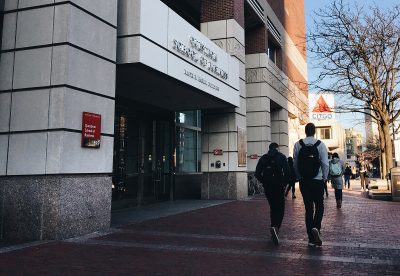
Boston University’s Institute for Sustainable Energy announced Wednesday it is partnering with the Cynthia and George Mitchell Foundation, a Texas-based foundation focusing on water sustainability, to conduct research on efficient long-term urban water usage practices, according to a press release from the university.
ISE Director of Research and Outreach Activities Jacqueline Ashmore said the project is a collaborative effort to create a model that protects city water supplies and sensitive ecosystems throughout Texas.
“It is something that is a critical component of the energy landscape,” Ashmore said. “So, we really jumped at the opportunity to work on this challenge.”
CGMF currently has projects in resource sustainability and education. It supports researchers and groups working to change the way humans consume and impact the environment, Marilu Hastings, the vice president of sustainability programs at CGMF, said.
The foundation works toward this objective by awarding grants, the latest of which has gone to the ISE, to help develop a plan that would revitalize the antiquated water systems that currently control freshwater resources in Texas, Hastings said.
The research the ISE will conduct includes analyzing case studies of integrated urban water management, Hastings said. The system is able to manage different types of water and create models that display how interconnected water systems are financially and environmentally beneficial over present-day disconnected ones.
Hastings said, since water in Texas is in such high demand, CGMF works to ensure there is enough to go around.
“In Texas, we are a drought-prone area and the water resources we have are over-allocated,” Hastings said. “Our program really pursues strategies to conserve water in the urban setting and protect supplies in the rural setting.”
Hastings said she was moved to ask Peter Fox-Penner, director of the ISE, to collaborate on this initiative because of how informed he is on the energy utility model.
“I have a great deal of respect for Peter’s excellent work on energy issues and his understanding of energy markets,” Hastings said. “I can’t think of anyone better than him to transfer this knowledge from energy to water.”
This collaboration may serve as a launching point for ISE, which hopes to use it as an opportunity to educate people on the true cost of water usage. They hope to collaborate with more local organizations to improve energy efficiency, Ashmore said.
“More broadly for us as an institute, we work across a whole suite of issues within energy, and this is really our chance to have a showcase project on water and communicate some of the connections between energy consumption and water consumption and how the two reinforce each other,” Ashmore said.
Many BU students said they appreciate this effort to help both the university and the country to be more responsible with sustainability.
Nikki Singh, a junior in the College of Arts and Sciences, said she appreciated BU’s efforts to reach across the country in the collaboration.
“I think [it’s] a great initiative,” she said. “BU is very much a global community, and I think serving other states in the country is a great way to reach out and try to further empower other communities.”
Tony Pham, a freshman in CAS, said he thinks the collaboration is valuable because now is an important time to take action.
“This is a very critical time we currently live in … we can either start conserving our resources efficiently and make them last for a very long time, or continue to overuse them to the point where sustainable practices won’t matter anymore,” Pham said.






















































































































